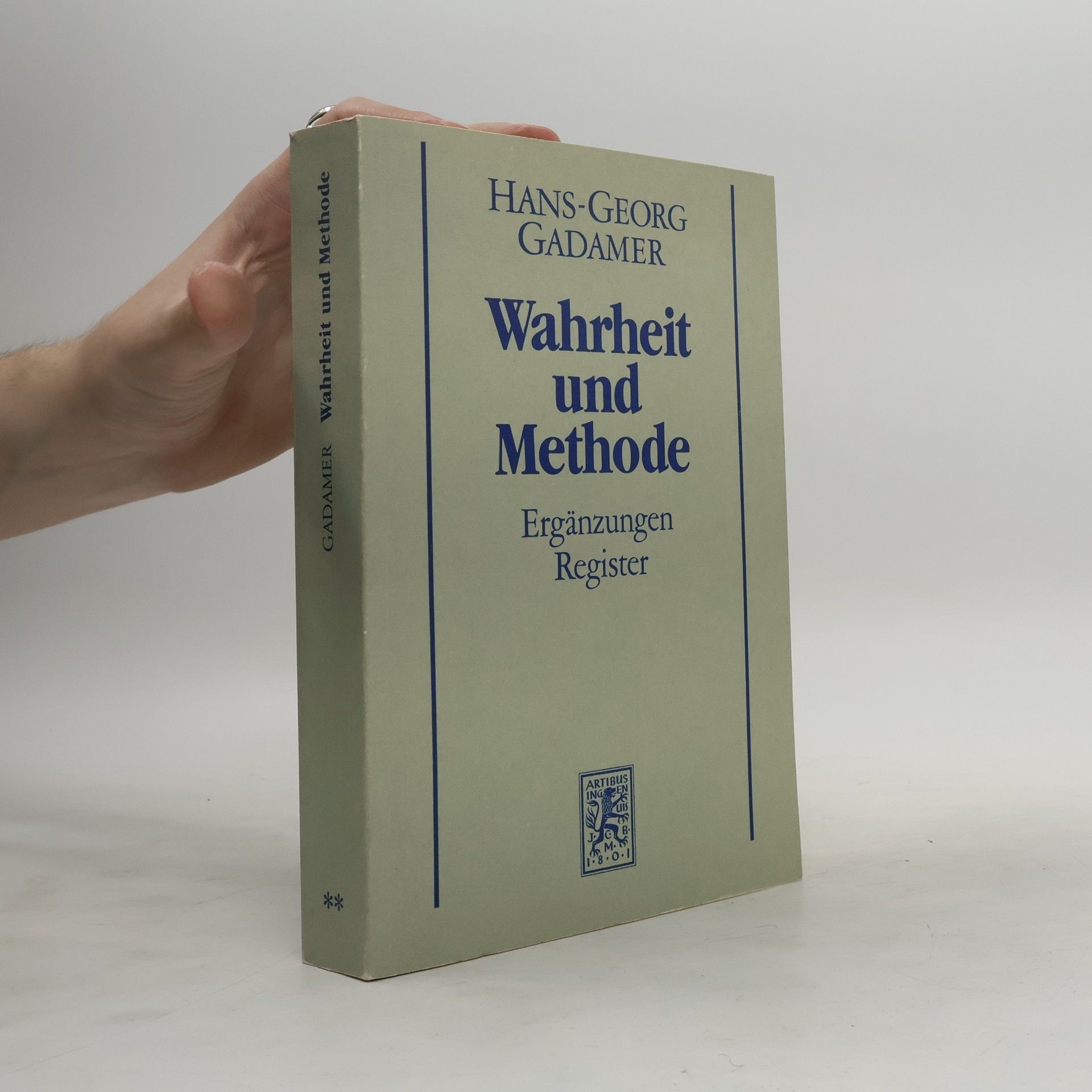Briefwechsel 1922-1976 und andere Dokumente
- 532 pages
- 19 hours of reading







Druhý svazek Gadamerova projektu filosofické hermeneutiky shrnuje texty zveřejněné po prvním vydání Pravdy a metody v roce 1960. Gadamer reaguje na kritiku své knihy, historicky prohlubuje a analyticky zpřesňuje klíčová místa prvního svazku. Mezi hlavními podněty byly veřejné diskuse s představiteli metodologické hermeneutiky, jako jsou E. Bett, E. D. Hirsch jr. a H. Albert, a také debaty s J. Habermasem a dalšími o univerzalitě hermeneutiky. Gadamer se zabývá otázkami vztahu mezi hermeneutickou zkušeností a metodickým poznáním, poměrem k řeči a tradici, výkladem pojmu „předsudek“ a vztahem ke kritice ideologie. S odkazy na historické prameny a argumentační figury nabízí konkrétní důkazy pro základní teze univerzální hermeneutiky. Zkoumá pojetí „zkušenosti“ a „zakoušení“ jako procesy, které přesahují subjektivitu a stávají se „děním“ a „událostí“. Nakonec představuje univerzální pojem „rozumění“ jako jednotu rozumějícího a rozuměného, což zahrnuje vyhlížení a pohlížení rozumějícího na svět, které se plynule přetváří v prohlížení sebe samého.
Während in dem Band »Der Anfang der Philosophie« (UB 9495) vor allem ontologische und erkenntnistheoretische Probleme im frühgriechischen Denken diskutiert werden, behandelt Gadamer in »Der Anfang des Wissens« die naturphilosophischen Grundlagen, insbesondere aber das Werk des Heraklit. Auch in diesen Erörterungen erweisen sich die Vorzüge der hermeneutischen Methode des Autors, der hier den Vorläufern der modernen Wissenschaft auf der Spur ist.
Das Phänomen des Verstehens und der rechten Auslegung des Verstandenen ist nicht nur ein Spezialproblem der geisteswissenschaftlichen Methodenlehre. Es hat von alters her auch eine theologische und eine juristische Hermeneutik gegeben, die nicht so sehr wissenschaftstheoretischen Charakters waren, als vielmehr dem praktischen Verhalten des durch die Wissenschaft ausgebildeten Richters oder Pfarrers entsprachen und ihm dienten. So drängt das Problem der Hermeneutik schon von seinem geschichtlichen Ursprung her über die Grenzen hinaus, die durch den Methodenbegriff der modernen Wissenschaft gesetzt sind. Verstehen und Auslegen von Texten ist nicht nur ein Anliegen der Wissenschaft, sondern gehört offenbar zur menschlichen Welterfahrung insgesamt. Fazit: Auch 'Wahrheit und Methode' ist zum Lehrbuch geworden, nach strenger Betrachtung vielleicht zu dem einzigen dauerhaften, zu dem es die philosophische Literatur in Deutschland seit den zwanziger Jahren gebracht hat (FAZ)
Pojednání z roku 1960 patří k zásadním dílům německé filosofie 20. století a významně přispívá k otázce povahy humanitních věd. „Metoda“ v názvu naznačuje, že dílo vzniklo v kontextu 50. a 60. let, kdy se projevovalo poválečné okouzlení technologií a víra v pokrok, což se odrazilo v novopozitivistických teoriích vědy. Gadamerova rozprava o metodě čerpá z odlišné tradice a rozšiřuje Heideggerovu myšlenku filosofické hermeneutiky. Prohlubuje úvahy o hermeneutické zkušenosti, dějinách a tradici, přenáší filologický výklad do oblasti filosofického myšlení. Nejvýznamnější přínos spočívá v spekulativním nároku, kdy na otázku rozumění odpovídá rozkrýváním jeho spekulativního rázu a vyvozuje důsledky pro hermeneutickou praxi. Zdůrazňuje nezbytnost časového odstupu, popisuje hermeneutický kruh a hájí produktivitu před-rozumění. Proti formalismu a představě svobody jako osvobození od tradice obhajuje rozumění jako výsledek dialekticko-spekulativní součinnosti. Tváří v tvář napětí mezi metodou a pravdou se přimlouvá za návrat k hloubce filosofie, jejímž středem je jazyk a hra s ním, která se týká pravdivosti obsahů, jež nás oslovují.
Written in the 1960s, TRUTH AND METHOD is Gadamer's magnum opus. Looking behind the self-consciousness of science, he discusses the tense relationship between truth and methodology. In examining the different experiences of truth, he aims to "present the hermeneutic phenomenon in its fullest extent.
An early articulation of Heidegger's philosophical method